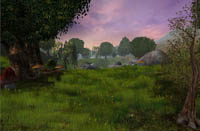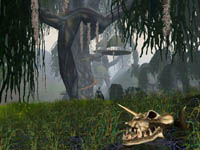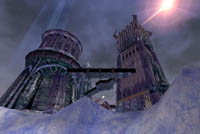|
|
|
Main News Forums Games Games Database Top 100 Release List Support Files Features Reviews Previews Interviews Editorials Diaries Misc Download Gallery Music Screenshots Videos Miscellaneous Staff Members Privacy Statement |
Horizons Interview Logan Horsford, 2002-08-29
RPGDot: What is your name and job title please? Paul: Paul Peterson, Game Designer. Shawn: Shawn F. Carnes, Game Designer. Dina: Dina Mastbaum, Game Designer. Steve: Steve Snow, Producer. RPGDot: How customizable is the GUI? Are all of the keys remappable or are there 'fixed keys' (ala AO)? Steve: Right now we don't have any locked/fixed keys on the client. Everything is 100% customizable today. We will ship with a default setting but this setting will be somewhat customizable through the game interface and fully customizable by the experienced player. RPGDot: Your FAQ mentions a tutorial - can you give us any more information on that? Paul: We plan to help out beginning players as much as we can, and as much as they want. We will try to teach people how to do things in our world instead of just thrusting them out and letting them figure it out for themselves. So if you want to be a warrior, we're going to teach you how to swing a sword at things. If you want to be a blacksmith, we'll teach you how to gather resources and make items. Or if you want, you can turn all of that off and discover how things work for yourself, but we want the tools to be available for someone who wants us to help them. RPGDot: How many NPC character models will there be for release? 
Steve: I can't honestly say at this time. For the majority of our towns we will be using player characters. As far as monsters go it's really too early to stick an exact number on it. RPGDot: Your FAQ mentions that the game will be primarily PvE (Player vs. Environment). Will PvP be consensual only, or limited to zones? Steve: We want PvP to be consensual through player choice. With this goal in mind we have an arena on the development slate and we are fairly certain it will be completed during beta. So PvP is consensual in the sense that you enter the arena. Obviously this is for a PvP environment within the game space for those who wish to participate in it. But the thing to note is that the only thing that is similar between our arena and arenas in other products is that it will support PvP. We have some very exciting features we will implement to increase the localized PvP arena experience. RPGDot: In your FAQ, it mentions that one may change his profession by going to various schools and training there. Does doing so cause a loss (sudden or gradual) of your own skills or is it possible to become 'a master of all trades'? Paul: Players do not lose any skill by switching schools. If a player wants to invest the time to join enough schools to get every skill, then they are more than welcome to do so. They won't lose any skills by switching around, but it will take a lot of time to build each of those schools up, and they won't be nearly as good in any one of them as someone who invested the same amount of time in a single school, but they will be able to perform more different tasks. In addition, some special abilities are granted by membership within a school, if you leave that school you will lose the granted special abilities. RPGDot: What is being done to move us from the widely perceived 'leveling treadmill' that most games (AO, AC, EQ, DAOC) embrace? Paul: One of the reasons that players feel like they are on a treadmill, is that there is no point besides experience for slaying a monster. In Horizons, the protection of the communities that the players are building in the Frontier provides a tangible reason for slaying the monsters; those monsters are trying to destroy the civilization that you are building! In addition, for most of the current games killing monsters is the only efficient way to get experience as adventurers. Players are largely forced to do so, and even more boringly, forced to sit in one place doing so. We're creating other ways for players to get experience that are actually reasonable. We want players to get appropriate experience for the time they invest in quests, gathering resources, crafting items or in exploring the world as well as for the time they invest in killing monsters. Also, the monsters have motivations that move them around the world of Horizons. They don't just "spawn" in a single location repetitively and then stand there waiting to be killed by bored players. RPGDot: Will critters drop loot equal to or better than what players can craft? Shawn: As we've talked about in the past, Horizon's trade skill system will be the way people acquire items in the game. So, as a result of this philosophy, monsters should not drop items like those made in trade skills. It's the path of least resistance; why, as an adventurer, should I bother dealing with trade skills at all if I can go out and spend time doing something I am going to be doing anyway (adventuring) to acquire an item comparable to what I make via trade skills? In Horizons, we've eliminated the quandary all together, because trade skills will produce the item in question, and it will not be dropped as monster loot. Monsters, however, will drop resources that go towards making items in trade skills. Some resources may be exclusively found as monster loot. This, however, will never create the situation that a tradesman who chooses to not adventure cannot make functional and desirable items because the resources they need are found exclusively as loot off of monsters. RPGDot: Will PC tradesmen be forced to compete with independent (non player controlled) NPC merchants? Shawn: NPC merchants in Horizons will serve two primary functions. First off, NPC merchants acting, as player-controlled vendors will aid players in selling the items they make. A player will be able to control a vendor, place items they want on the vendor to sell, assign buy lists to the vendor enabling the vendor to buy specific items the player wants from the sold or bartered items of other players. Secondly, specific NPC merchants will resell goods that other players simply wanted to dispose of for some cash value. Look at these more like a resale shop of sorts; people dump items for pennies on the dollar, and then turn around and mark them up considerably for resale. These vendors will represent the top-end baseline for item prices in the game. Sure, you can buy 15 Large Iron Bars from the NPC merchant for 50 gold, but you could probably get them from a player for less than half the price; you just need to find a player selling them, or a player's NPC vendor. So, the only way NPC merchants will compete with PCs will be because the buyer isn't interested in the cost of the item they are buying. If this is the case, then there wasn't really any competition to begin with, eh? RPGDot: Your FAQ mentions your game will have books within the game world. Will PC's also be able to write books, trade/sell them, etc? 

Shawn: I'm certainly not opposed to being able to make books and being able to write in them. That's something that would certainly enrich the game experience, though I don't know if I'd have the time to read, "TEH ADVANTRUZ OF 1337MAN". ;) Seriously, books and scrolls exist as items in the trade skill system and there's a reasonable chance that players will be able to write on their own books or scrolls by release. RPGDot: If you set something on the ground, does it appear as a bag (like Everquest) or as what the item is (like Morrowind)? Steve: It will appear as a bag. Some of us here have spent too much time bumbling around in corridors that were a little too dark trying to find a dagger on the ground. The bag on ground solution will allow us to place an object that is highly visible and very selectable for the gameplay experience. RPGDot: What are the main influences in the creation and design of the gameworld? Paul: I'm a huge fantasy fan. I read Tolkien very early, and plowed my way through every other fantasy novel I could put my hands on. I started playing Dungeons and Dragons before there were hardcover books for it, and still love it today. I'm sure that some sparks from each of them come out when I'm working on the world. Shawn: For me, there are two sets of influences contributing to my design decisions. First, there is the element of fantasy that dictates story and content decisions. I grew up playing (and still play when time allows) Dungeons and Dragons, Vampire: the Masquerade, and other Pen-and-Paper RPGs. I've also worked at Wizards of the Coast as an RPG designer. I'd like to think that by now, I have a pretty good idea what makes up a good story. Dina: That's a pretty big question... I think there's a mix of influence from many sources out there, from D&D to fantasy games, on both the PC and Console platforms. I've been playing these games pretty much my whole dorky life. We also have some highly creative people working on many unique aspects of the world. I've been lucky enough to work for another MMOG ( UO ) and as a game designer so that experience has been completely invaluable as well. I've learned so much in the past couple years that it's great to put my experience and imagination to such good use. Specifically, I have found a large amount of influence in high fantasy RPG's such as Final Fantasy or Baldur's Gate and spent a lot of time examining the current MMOG market. And, of course, listening to what the players of these games speak up about. With Horizons, it is a combination of our vision, experience, and commitment to create a world that truly lives and breathes. RPGDot: Tell us about the AI of the creatures. For example, if I were to shoot a deer, how would it react? Steve: We want our monsters to think and operate within two types, solo and group. Solo is a creature that will operate and react on it's own with no evaluation of counterparts that might be near. A lot of the standard gameplay someone would encounter in the current products would apply here. Our group-oriented creatures will operate with others as a single unit. There is a strong focus pushing towards creating monster groups that are reactive and decisive to their situation. There will be different degrees of difficulty for monster groups and we have two controls to maintain this, base ability access and AI patterns. RPGDot: Many games have attempted to slow their rate of level advancement by introducing downtime. Players are very concerned about it. In EQ, downtime was severe - up to 20 minutes. In DAOC and AO, it is under 1 minute. I view this as an excellent trend. If I was the most powerful fighter possible in your game and wanted to rest after a nasty combat in which I was nearly killed, how long would it take me to get back my full hit points? Mana? Paul: We're pretty much against the idea of forced downtime for players between battles. We want you back up and having fun in our game as soon as possible. So our plan is to make recovery between battles very rapid by accelerating your healing. The problem this poses is how to prevent players from exploiting whatever system we create to heal quickly during the fight. We're confident that we will be able to do so, however. I can't really give you a solid answer at this point other than that it will be very short. This is how we rate |
|||
|
All original content of this site is copyrighted by RPGWatch. Copying or reproducing of any part of this site is strictly prohibited. Taking anything from this site without authorisation will be considered stealing and we'll be forced to visit you and jump on your legs until you give it back. |
||




